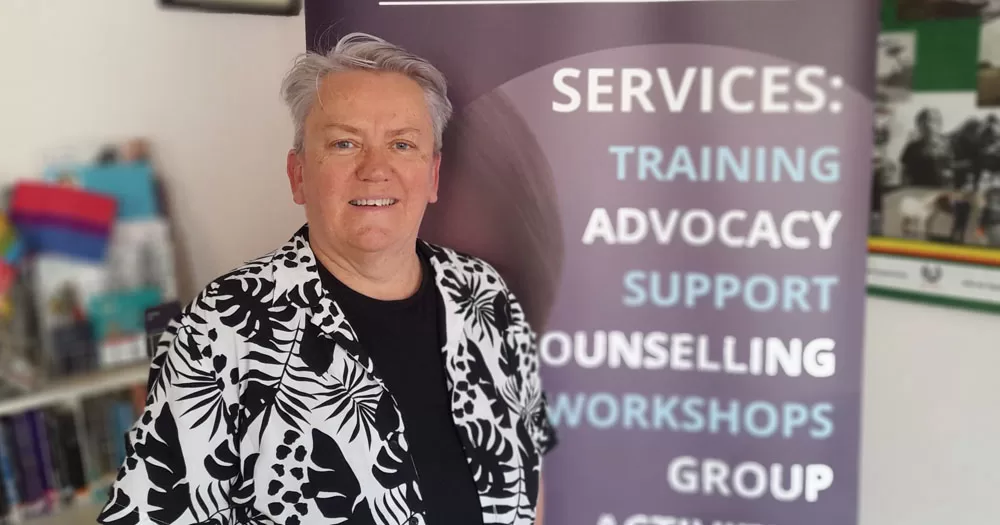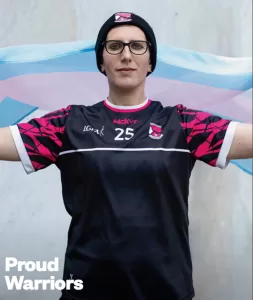As we celebrate Pride Month across this island, we must confront the harsh reality that our community faces a rising tide of disinformation, scapegoating and hate. It’s time again for us to channel our collective pain and anger into action for social justice. As part of the #StrongerTogether initiative in collaboration with the Rowan Trust and the Hope and Courage collective, GCN interviewed Kate Moynihan, CEO of LINC, who spoke about the importance of allyship with the trans and non-binary communities.
In the late 1990s, the organisation now known as LINC was set up in Cork, and since then, it has done an array of incredible work as the Republic of Ireland’s only community development group catering exclusively to queer women. For over 20 years, the team has been committed to informing and impacting social inclusion policy practice and providing peer support services to all who need and want them.
“It was set up by people who were interested in community development, that had a community development background and a feminist background,” Kate Moynihan, CEO of LINC, explained.
Of course, throughout its lifetime, the group has experienced many changes, whether it be its name, structure, staff or the services it provides. However, one thing that has remained a constant, is its core values.
“We’re still a feminist organisation, we work from community development principles, our community really decides what we’re doing, and no major policy changes within the organisation are decided without consulting the community,” Kate said.
As the far right continues to rise across the world and in Ireland, one of the movement’s tactics seems to be dividing minority communities, by circulating harmful and untrue narratives, a portion of which target the trans community. In light of this, both Kate Moynihan and LINC are determined to voice their support for their trans and nonbinary friends, family and peers, sending a clear statement of love and solidarity.
“LINC has always been trans-inclusive since before it was set up. It was agreed if you identify as lesbian, bisexual, that was it. Whatever your gender identity is, you are welcome in LINC, and there have always been trans women…We really want that message going out that we are trans-inclusive and non-binary-inclusive,” she emphasised.
Furthermore, Kate displayed that this sentiment is echoed worldwide, far beyond just LINC and its members. In fact, she cited a study released in 2023 by UK organisation Just Like Us, which found that lesbians are the most likely subset of the LGBTQ+ community to know a trans person (92%) and that they are “supportive” or “very supportive” of trans people (96%).
An example of this allyship could be seen earlier this year in Australia when Dykes on Bikes joined a protest against a prominent anti-trans figure. Similarly, during this year’s Lesbian Visibility Week, a UK-born initiative celebrated around the globe in April, organisers projected a proud message of solidarity with “ALL women, especially those who come from marginalised communities”.
Exploring the root of the harmful and divisive narrative spewed by extremist groups, Kate said: “We always see this where you get marginalised groups put against each other…For us, it’s really important that we stand together with our trans community, with our trans members of LINC, and that we’re seen to be doing that.”
She continued: “We want people to know who we are, and this is who we are. We are lesbian, bi, queer, trans, nonbinary, this is our community.”
In terms of what can be done to counteract the rising transphobia that is happening in coincidence with the emergence of extremist ideology, the power of strength in numbers and unity was highlighted by Kate. “I think it’s just really important that we talk to each other and that we work together. We have to listen to each other, to know that we have each other’s back, that we’re not working in silos, that we’re actually working together.
“The far-right affects us all. The experience is intersectional for all different communities being affected by the far right,” she added.
“We’re all affected. If our trans community is being excluded and destroyed, being told they don’t exist – that was the story for all of us at one point.”
Furthermore, it’s important to remember that during those times, trans folk across the world were often spearheading LGBTQ+ rights movements, fighting for the achievements we now reap the benefits of.
In Ireland, we boast an incredible array of trans and non-binary trailblazers who have fought so hard for queer liberation, some of whom are lesbians. As trans rights remain under attack, as do the lives of many marginalised groups at the hands of the far right, it is essential that, as a community, we show up together and fight the good fight arm in arm. Diversity, not division. No LGB without the T.
This story originally appeared in GCN’s Pride issue 378, as part of an ongoing feature on solidarity that was created in cooperation with the Rowan Trust and the Hope and Courage Collective. You can read this interview with Kate Moynihan and other activists in the full issue here.
Want to be featured in this special campaign? Share a message of solidarity using #StrongerTogether, tagging GCN or email [email protected].
© 2023 GCN (Gay Community News). All rights reserved.
This article was published in the print edition Issue No. 378 (June 1, 2023). Click here to read it now.
Support GCN
GCN is a free, vital resource for Ireland’s LGBTQ+ community since 1988.
GCN is a trading name of National LGBT Federation CLG, a registered charity - Charity Number: 20034580.
GCN relies on the generous support of the community and allies to sustain the crucial work that we do. Producing GCN is costly, and, in an industry which has been hugely impacted by rising costs, we need your support to help sustain and grow this vital resource.
Supporting GCN for as little as €1.99 per month will help us continue our work as Ireland’s free, independent LGBTQ+ media.

